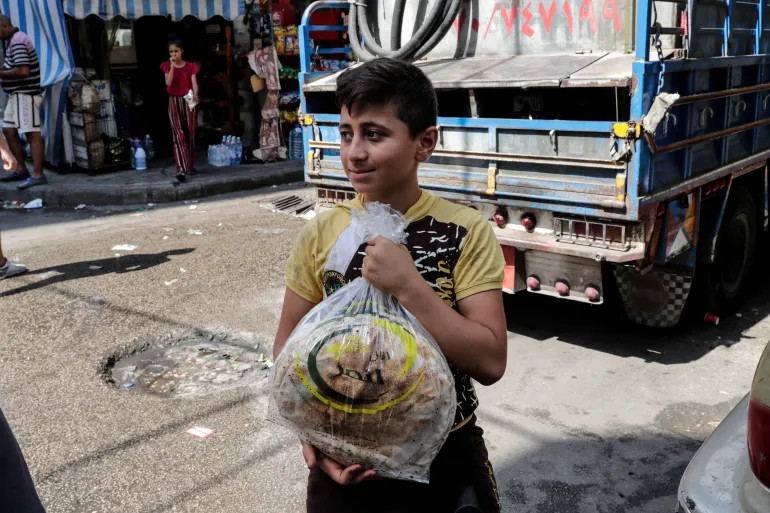The war in Ukraine has left cash-strapped Lebanon scrambling for alternative sources of fuel and wheat.
Saheer Ghazzaoui, a 24-year-old graphic designer, was already spending the majority of her income helping to provide for her family.
But now, with fuel prices surging in Lebanon, and fears of wheat shortages as a result of Russia’s war in Ukraine, the money she brings in each month is no longer enough.
“We struggle to get gas, and we’re already paying so much for food, medicine, and tuition,” Ghazzaoui told Al Jazeera. “[Now] all our salaries are going just to the necessities, and sometimes it’s not even enough so I have to [take out money] from my savings.”
Up to 90 percent of Lebanon’s wheat and cooking oil imports come from Ukraine and Russia, as well as a large proportion of grain imports. The fighting in Ukraine has engulfed the country’s southern ports, putting a stop to shipments, and imports from Russia have been hampered as a result of financial sanctions imposed on Moscow.
The impact means that Lebanon now has only one month’s wheat reserves left, deepening an already-existing food security crisis in the country.
Additionally, due to the sharp increase in global oil prices, official prices of fuel in Lebanon have increased by a staggering 33 percent since Russia’s invasion of Ukraine less than two weeks ago.
These ongoing developments have worsened Lebanon’s economic crisis, which has already pulled more than three-quarters of the country’s population into poverty, and devalued the Lebanese pound by about 90 percent against the US dollar since August 2019. Lebanon’s food inflation is now among the highest in the world, with food prices rising by 1000 percent.
The impact of the war in Ukraine, on top of the preexisting situation, therefore threatens to bring more unrest to the country. The government is now seeking to avoid a repeat of last summer when public life in Lebanon was virtually paralyzed as long queues and rationing at petrol stations and grocery stores put the cash-strapped country on edge.
Mohammad Abou Haidar, the director general of Lebanon’s Ministry of Economy and Trade, told Al Jazeera that the ministry’s Consumer Protection Directorate has carried out inspections of grocery stores, petrol stations, and bakeries across the country in an attempt to prevent illicit price hikes and hoarding by business owners.
But the ministry has only 70 inspectors available to monitor thousands of businesses, forcing Abou Haidar to join the inspections himself.
“[Some supermarket owners] want to remove cooking oil from the shelves and hoard them, while importers are rationing fuel supplies as much as possible,” Abou Haidar told Al Jazeera. “Of course it causes panic. If you and I saw this, we’d run to the store to buy a few gallons of oil.”
New strategies
Despite the supply problems, fuel shipments have been reaching Lebanon, albeit in smaller amounts. George Brax, the spokesperson for the Syndicate of Gas Station Owners, told Al Jazeera that most of the gas stations that have temporarily closed are waiting for importers to deliver their supplies.
“We don’t want to return to the scenes of long queues, God willing it won’t happen,” said Brax.
However, Brax declined to give details about the severity of the fuel shortages, despite admitting their existence.
“Let’s not get into that; hopefully, it will all be resolved in the coming days.”
Meanwhile, the government is trying to find new strategies to deal with the wheat shortages. New regulations dictate that wheat be used exclusively to make flatbread, a local staple. Amin Salam, Lebanon’s Minister of Economy and Trade, has also been trying to find alternative countries to import wheat from, such as India, France, and the United States.
Last week, Salam asked the United States for aid to pay for the import of $20 million worth of wheat, which would provide an additional month’s supply, a rare intervention from the state. Abou Haidar said the minister has also been communicating with other countries in an attempt to find similar solutions, and that the response has been encouraging, particularly from the US.
However, Zeina El-Khatib, a Research Associate at the Beirut-based research centre Triangle, told Al Jazeera that the ongoing shortages cannot be fully resolved with stopgap measures.
“I can safely say that the Russo-Ukrainian conflict certainly impacts availability and access [to fuel and wheat],” El-Khatib said. “Without a clear government plan in place to restore the national Lebanese strategic grain reserves, there is no viable sustainable alternative.”
The Lebanese government has struggled to implement wholesale economic and administrative reforms, and has failed to reach an agreement with the International Monetary Fund for a reform program to make the country’s economy viable again, despite negotiations beginning almost two years ago.
With the government nearly bankrupt, El-Khatib says that it cannot continue a trend of implementing temporary measures to postpone facing the problem. Many people in Lebanon do not trust the authorities or believe that the economic situation will improve in the short term.
“If the panic buying continues, I doubt we will be able to see bread in stores,” El-Khatib said.
“[And the scenes of last summer] will keep haunting us until the government can come up with an economic recovery plan and restore the trust and confidence of the international community, in addition to its own people.”
The situation has left Ghazzaoui, like many Lebanese, feeling powerless.
“It’s like we’re stuck in an hourglass and we’re drowning in sand – that’s what living in Lebanon feels like. It’s like we’re just waiting for the worst and we’re suffering along the way until it fully gets to us.”
Source: Aljazeera


